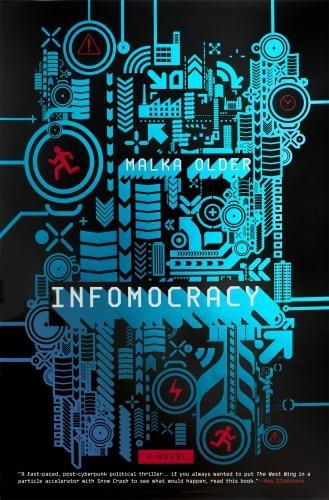enne📚 reviewed Infomocracy by Malka Older (The Centenal Cycle, #1)
Infomocracy
2 stars
Content warning minor plot spoilers, uspol
I read this once a long time ago (a Hugo novel nominee in 2017), but re-read it for #SFFBookClub this month.
Overall, the genre of Infomocracy is "political thriller" (action! elections! journalism!) and so ends up being much more plot-driven than character-driven. I think the Ken/Mishima romance suffers a lot from this, as it felt more told than shown; maybe it's just too straight for me but I had trouble understanding what they saw in each other other than being political workaholics.
Coming from a US politics context, this doesn't feel like it has aged that well. Current political problems that come to mind immediately without much thought (misinformation, sure, but also: gerrymandering! voter suppression! outright threats of violence! January 6th! refusal to accept unwanted election results!) make "oh gosh somebody might be secretly but mostly politely trying to steal an election" seem a bit tame in comparison and maybe doesn't land as well as it did in 2017.
(Also, this is the most minor of quibbles, but holy moly, I would like to buy something more than first past the post voting system! Where is approval voting or ranked choice?)
This is a very long digression on a minor point, but it's very interesting for me to compare the worldbuilding here to Ada Palmer's Too Like the Lightning, another story (among a myriad of other topics) that also has a new governmental structure. In Infomocracy, it's microdemocracy (the world is districted into "centenals" of 100k geographically adjacent people each, and each centenal votes on what government they want, and the supermajority winner gets some extra power). In Too Like the Lightning, it's the Hive system, where every person in a geographically independent sense can join a particular hive with its own government, rules, and laws, etc. However, various geographic areas are run by particular governments.
In Infomocracy, the worldbuilding backstory is that there exists a new Lumper device. A Lumper magical handwave disables metal firearms within its effective radius and the book says that it is some combination of the Lumper, body armor, and Information bureaucracy that creates the "pax democratica" and makes microdemocracy possible. I know, I know, this is a fictional story, but I just find it very hard to get from point A to point B. Why would any government ever agree to this concept even with these changes? I want to know how we got here. (The sequels do not answer this.)
Too Like the Lightning has a similar magical handwave device, a flying car. (Surprisingly, such a new device also appears in Infomocracy but it does not have any political impact at all???) Flying personal vehicles allow people to be mass evacuated from continent to continent easily, to evade drafts and wars and calamities. When some governments start to allow people to freely choose who is part of them regardless of geographical location, the other governments are forced into the scheme because they can no longer control people who can be flown out at any time.
At any rate, I think there was lots of interesting ideas here, but overall I found this a bit dry and implausible for my tastes.

